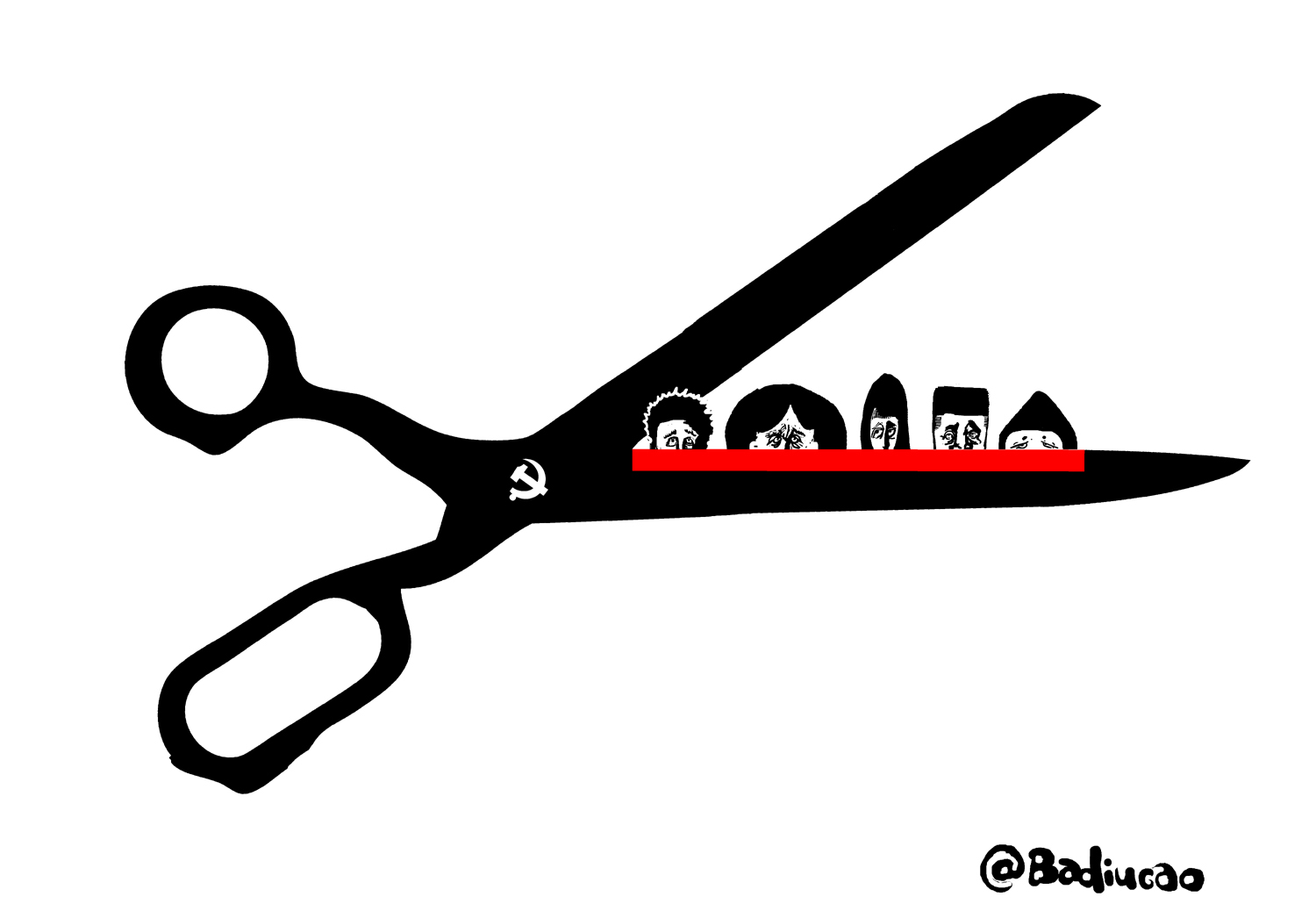For his latest contribution to CDT, Badiucao comments on recent official pronouncements about Internet control, notably a speech made by President Xi Jinping on United Front work in which he called on officials to reach out to online writers to encourage them to “purify the Internet.” In Badiucao’s drawing, Internet control is depicted in starker terms:
United Front, by Badiucao for CDT:
Last week at a meeting on United Front work, Xi promoted a softer approach to Internet control by calling on cadres to reach out to new media personalities and non-CCP members who may be supportive of the government’s policies. From a Xinhua report on the meeting:
To unite the non-CPC intellectuals is basic and strategically important work under the party’s efforts to unite the nation and pool strength for realization of the Chinese dream of national rejuvenation, Xi said at a three-day meeting of the united front work, which closed on Wednesday in Beijing.
High value should be placed on intellectuals in new economic and social organizations and they should exert their roles in development. Students studying abroad should also be encouraged to return home and serve the country in various ways, said the president.
He called for officials to improve their work style and learn to make friends with non-CPC intellectuals in “doing ideological work”.
Xi asked them to establish regular contacts with outstanding intellectuals from new media organizations and strengthen interactions with them both online and in reality, encouraging them to make contributions to purifying the cyberspace. [Source]
Ting Shi at Bloomberg reported on Xi’s call for officials to work with new media representatives:
Technology leaders should “demonstrate positive energy in purifying cyberspace,” Xi said at the end of the party’s first national United Front conference in almost a decade, Xinhua reported. He called for regular contact with new media representatives to build support for the party’s agenda.
“The addition shows the party is treating the Internet and new media as strategically important,” said Qiao Mu, a media studies professor at Beijing Foreign Studies University. “It also indicates a change of tactics. The so-called united front work takes a different, softer approach from the usual crackdowns.” [Source]
While the kinder, gentler approach to influencing online opinion may be a welcome shift from the string of recent arrests and ongoing censorship, Teddy Ng and Mimi Lau at the South China Morning Post reported on doubts about the efficacy of Xi’s new tactics:
Qiao Mu, dean of Beijing Foreign Studies University’s Centre for International Communication Studies, said Xi’s remarks showed the party was now trying a softer approach in managing new media, rather than focusing on technical management and licensing issues as with traditional media in the past.
“But I am highly doubtful about the effectiveness of controlling and cleansing opinions on the internet,” the international relations expert said. “After all, the internet is the only place for mainlanders to express themselves as traditional media has been so heavily suppressed.”
The university’s journalism professor Zhan Jiang welcomed the party’s softer approach towards opinion leaders on the internet.
However, he said: “But I doubt it is going to be effective to expect the internet to be filled only with positive energy.” [Source]
In 2014, at a meeting of the Beijing Forum on Literature and Art, Xi called on China’s artists and writers to promote Party ideology and he praised two bloggers for their “positive energy.” His praise soon became the subject of netizen scorn when one of the bloggers held up by Xi, Zhou Xiaoping, was ridiculed for being a nationalistic writer who was loose with facts. Last month, the Communist Youth League launched a “Youth Internet Civilization Volunteer Campaign” which aimed to gather over 10.5 million volunteers across the country to exemplify “positive energy” in Internet usage, post comments that support Party ideology, and report “unhealthy” online information.
More recently, the People’s Liberation Army has taken a less gentle and more combative approach with regards to online expression in several recent editorials. From one recent commentary, translated by China Copyright and Media:
In the present and future periods, it will be difficult to fundamentally change the situation of Western monopolization of online hegemony, and its occupancy of the superior position in online information dissemination. The circumstances of online struggle are grave, complex and long-term, it is still generally the case that the enemy is strong and we are weak, the enemy is attacking and we are defending. Are we “mid-stream water” or is “the current flowing East”; are we “silent lambs” or are we “valiant warriors”, a time has come to choose, and a time where we must counterattack firmly. The “main force” must be brought onto the “main battlefield”. Only if our Army keeps close pace and stands in the front ranks, and counterattacks well, will it be possible to defend “online sovereignty” and build an “online Great Wall”! [Source]
CDT is now selling t-shirts and iPad covers featuring Badiucao’s work in our Zazzle store. See also a Q&A with Badiucao in which he discusses his artistic and personal influences, and his earlier cartoons for CDT.









